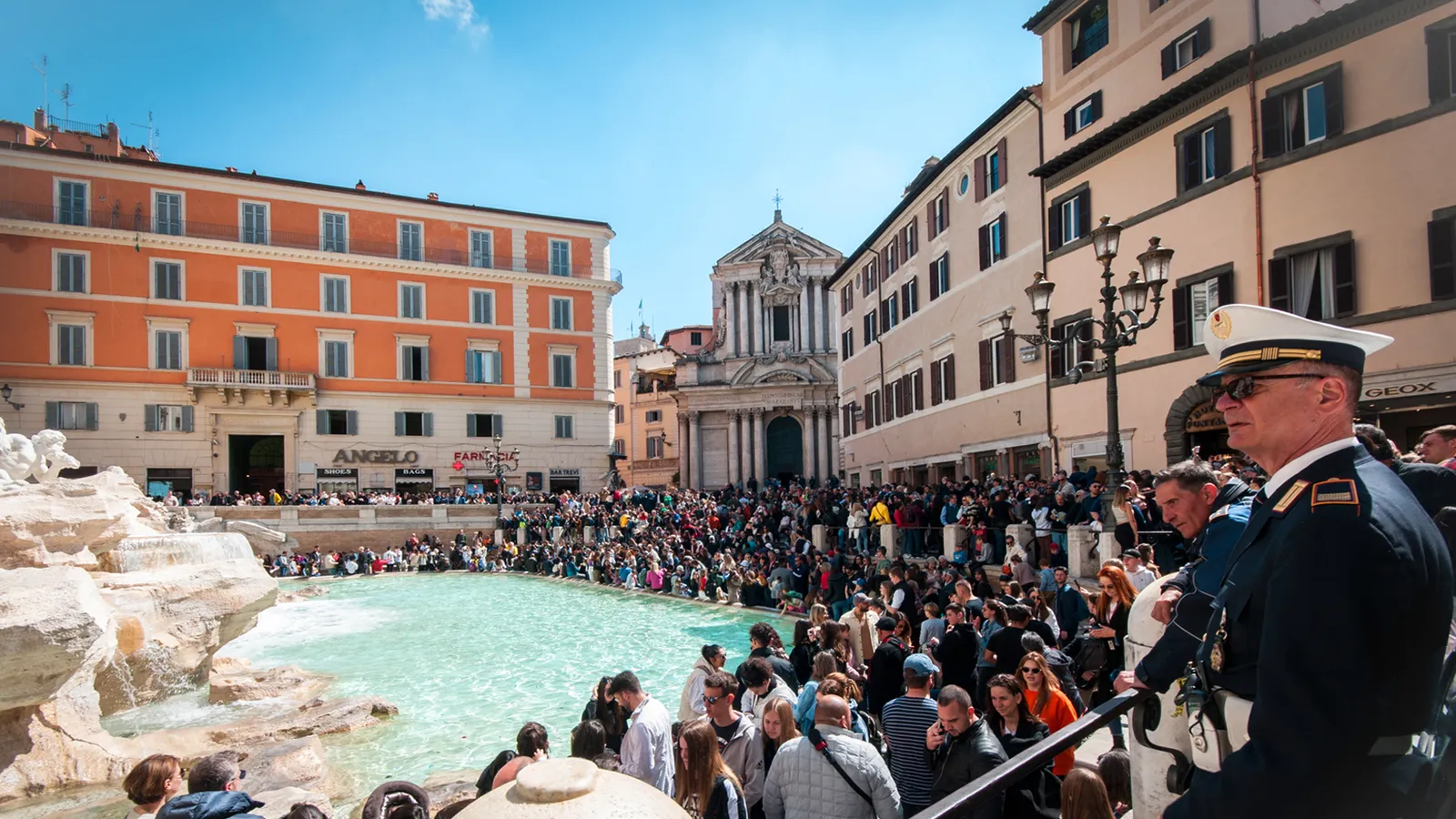Italy takes aim at tourists with Airbnb crackdown and loudspeaker bans
Italy's fight against overtourism now includes stopping tourists from lingering on bridges.

According to the United Nations World Tourism Organization, in 2022, nearly 50 million people visited Italy, a nearly one-for-one match on the nation's total population of locals. As a result, Italy has strengthened its stance against overtourism, with new entry fees and group size restrictions in Venice for 2024 being the latest in a slew of new regulations. Additionally, a few recent events have led the European nation to propose policies to combat transgressions by ill-behaved visitors.
Take, for example, in 2023 when a tourist took a swim in the centuries-old Trevi Fountain, one of Rome's most iconic sites. The occurrence was so dramatic that local officials contemplated limiting access to the historic monument. However, like previous calls to erect a glass barrier around the fountain to protect it from unruly travellers, this notion was shut down after experts said it would impede the view of the fountain, with one expert telling La Repubblica the idea was “really silly”. (Just around the corner at the Spanish Steps, though, officials enacted a rule back in 2019 stating that neither locals nor tourists can sit on the steps, even for a photo opp. If caught taking a seat, tourists risk a €250 (£214) fine.)
But it’s not just bad behaviour Italy is contending with. It’s sheer overtourism too.
"When I first moved to Rome, I couldn't wrap my mind around the number of tourists wandering the streets regardless of the time of the day. But when the high season finished, the number of tourists didn't change," said Viktoriia Khutorna, a communications specialist who has been living in Rome for nearly two years. "In October, reality kicked in harshly – I realised that there is no such thing as 'off season' for Italy. People come to the country regardless of the month of the year thanks to the good weather."
Khutorna acknowledges that tourism is a major contributor to the Italian economy. In fact, it accounts for more than 10% of Italy's gross domestic product, with one out of every nine jobs in the country coming from hospitality. Nonetheless, "overtourism is a problem in Italy," she said. "For instance, the sidewalks in Rome are very narrow, so with so many tourists, it's impossible to walk comfortably in the streets. Another challenging thing is public transportation. People are squished in autobuses and metro trains sardines in a can. And don't even let me start on the litter problem."
The effects of overtourism across Italy
Starting this June, tour groups in Venice will be capped at 25 people per group, officials announced in December. And tour leaders will no longer be allowed to use loudspeakers to communicate with their flocks as this "can generate confusion and disturbances". The devices will be banned in the city and on nearby islands, officials said in a statement. And, as part of the new rules, tourists are also asked to no longer pause while traversing the city's bridges.
"It is an important measure aimed at improving the management of groups in the historic centre and on the islands of Murano, Burano and Torcello," said Elisabetta Pesce, the official in charge of security in Venice. "It's about promoting sustainable tourism and guaranteeing the protection and safety of the city."
Venice and Rome aren’t the only destinations in Italy enacting regulations to both encourage better traveller etiquette and curb overcrowding issues.
In Portofino, tourists can get fined for "lingering" too long while taking a selfie. In Alto Adige, a region in Northern Italy, overnight tourism is capped to 2019 levels to prevent overcrowding. In the summer, visitors to Sardinia must book a reservation to use the beach via the app Cuore di Sardegna. And all over Italy, short-term rentals are being heavily regulated, including in Florence, where new short-term licenses have been completely banned in the city's centre to help free up housing for locals, which could in turn lessen the overtourism issue as people will have fewer places to stay.
“We are putting a simple ban in the UNESCO area to meet our responsibilities of protecting the cultural and material identity of the centro storico, and to dampen the effect of rent increases across the entire city – which are directly linked to the boom of short-term tourist rentals,” Dario Nardella, the mayor of Florence, told reporters in 2023.
BBC Travel reached out to Airbnb for comment and a brand rep responded that Airbnb wants to "work with Florence to create a way forward that protects local families who rely on the income they make from hosting. Airbnb is an economic lifeline for many Italians; one in three Hosts say the extra income helps them afford their homes and rising living costs. We recognize the challenges facing historical cities and welcome progress from the Italian government on new national rules, which will help support the policy goals of cities like Florence."
Still, will all these rules be effective in paring down visits to Italy?
"Italy has been experiencing overtourism, but [it's also happening in] many cities in Europe and countries around the world," said Simone Amorico, CEO of the destination management company Access Italy. Amorico says the best solution may be to get off the beaten path and, unsurprisingly, invest in a tour guide. "It is important to be advised by a travel advisor... For us, it is not only about the popular bridges, but we can show the insider Venice – the neighbourhoods that are less known and more authentic, to see where local artisans restore and build gondolas, for example. Or visit the Doge Palace after hours when it is less crowded, or a cooking class in a private home."
As for destinations limiting the number of short-term rentals, Amorico doesn't see that as a problem. As he says, "There are so many amazing family-owned hotels" to check into instead.
-bbc







